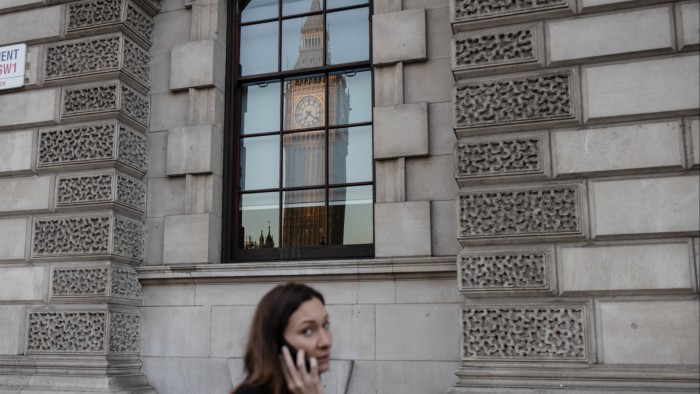UK public sector projects under pressure to do more for less

Simply sign up to the Management consulting myFT Digest -- delivered directly to your inbox.
Management consultants are hopeful that tighter government spending this year will spark more work, as departments and local authorities seek help with cost-cutting and restructuring.
The government spends around £300bn a year on public procurement — buying in goods, services and work — which is roughly one in every three pounds of public money. And the Management Consultancies Association (MCA) says the industry’s revenues from the public sector increased by 16 per cent in 2021. Now, a procurement bill is passing through parliament that is expected to make the awarding of government contracts to private sector consultants more efficient.
However, this will do little to reduce the impact of the spending constraints expected by many in Whitehall. Tony Travers, a local government expert and visiting professor at LSE London, a research arm of the London School of Economics, says UK chancellor Jeremy Hunt protected investment in the last spending review, in November, but there will still be a squeeze given that costs are going up as a result of inflation.
“Capital investment starts to fall in real terms after 2023/24,” notes Prof Travers. “There will be less relative to the vast backlog of projects such as levelling up. The years of plenty for capital investment are coming to an end.”
In these conditions, management consultants are setting out their stall as the means for central and local government departments to cut costs and refocus strategies.
The chancellor was not specific about cuts, but Whitehall insiders say there is general pressure to find projects that are not delivering value for money. “It’s a tighter picture for procurement going forward,” according to Prof Travers.
Rohan Malik, UK&I government and infrastructure leader at audit and consultancy firm EY, says that for large-scale infrastructure projects, rising inflation means the government’s public investment freeze represents a real-terms cut for capital expenditure.
“This puts pressure on the UK’s already-delayed infrastructure pipeline and risks missing an opportunity for economic growth at a time when markets are readying for recession,” he says.
Adding to the confusion has been the shift in perceived government priorities, with business leaders worrying that projects to address climate change, for example, are being slowed or discarded.
One senior public procurement expert says large, expensive projects are at the mercy of the shifts in politics and the different priorities shown by the three Conservative prime ministers in the past year alone. “Whatever happened to the 40 hospitals?” he says, that were to be built by 2030. “Suddenly, these get diluted into new wards or extensions.”
Senior civil servants have become adept in slowing down the system, he adds, “knowing a new government will change things anyway”.
The flip-flopping of policy priorities also has a chilling effect on private sector involvement. “Private sector capital is available and waiting to be mobilised, but institutional investors need clarity on the UK’s national infrastructure priorities and the projects the government wants to pursue,” says Malik.
Rachel Taylor, who leads accounting and consulting firm PwC’s UK government and health industries team, says there will be difficult decisions about some projects, particularly in infrastructure. The government has said it will not extend policies such as the private finance initiative, which invited private companies to finance, build and run infrastructure including schools and hospitals, for public use. But Taylor believes many will continue, “partly, frankly, because they provide a huge amount of jobs”.
Even so, she says the government will want to ensure the projects it invests in make improvements on the ground. “It’s about delivering more for less.”
Tamzen Isacsson, chief executive of the Management Consultancies Association, says her members expect to be busy helping government departments to find efficiencies and deliver projects.
Consultancies are being asked now to “save government money and ensure that taxpayer money is put to good use”, says Isacsson. But she expects some advisory projects to be stopped or put on the back burner.
Work with local authorities might be more affected by spending cuts, she adds, but many other areas — such as NHS spending — are “relatively protected”.
For Malik, management consultancy adds the greatest value “when it’s focused on providing specialist skills, such as sustainability and data analytics, rather than just adding additional resources”.
Consulting on digital transformation is also expected to increase, as departments try to modernise outdated systems. Other growth areas include recovery and support schemes, cyber security, sustainability, and UK border procedures post-Brexit.
Comments